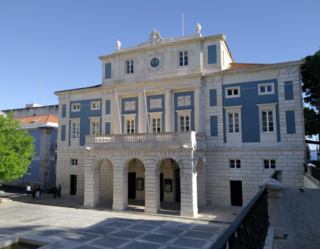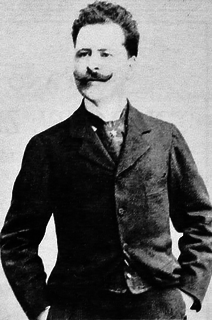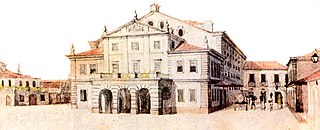Related Research Articles

The music of Brazil encompasses various regional musical styles influenced by European, African and Amerindian forms. Brazilian music developed some unique and original styles such as forró, repente, coco de roda, axé, sertanejo, samba, bossa nova, MPB, música nativista, pagode, tropicália, choro, maracatu, embolada, frevo, brega, Brazilian funk, modinha and Brazilian versions of foreign musical styles, such as rock, soul, hip-hop, disco music, country music, ambient, industrial and psychedelic music, rap, classical music, fado, and gospel.

The Teatro Nacional de São Carlos is an opera house in Lisbon, Portugal. It was opened on June 30, 1793 by Queen Maria I as a replacement for the Tejo Opera House, which was destroyed in the 1755 Lisbon earthquake. The theatre is located in the historical center of Lisbon, in the Chiado district.

Infanta Maria Teresa of Braganza was the firstborn child of John VI of Portugal and Carlota Joaquina of Spain, and heir presumptive to the throne of Portugal between 1793 and 1795, until her short-lived brother António Pio was born.

Marcos António da Fonseca Portugal, known as Marcos Portugal, or Marco Portogallo, was a Portuguese classical composer, who achieved great international fame for his operas.

Don Pedro Carlos was an Infante of Spain and Portugal.
Teatro Nacional may refer to:
António LagartoGOIH is a Portuguese set and costume designer and artist.
São Carlos is Portuguese for Saint Charles. It may also refer to:

Maurício (Moisés) Bensaúde, was a Portuguese operatic baritone. He arrived in Lisbon in 1884, where he received vocal training for a short time, and then made his debut in the same year at the Teatro da Trindade in Lisbon, in the opérette La petite mariée by Charles Lecocq. He then worked in another operetta at the Portuguese capital, in the Teatro de D. Maria, where he appeared in operettas and musical comedies. However, he continued to take singing lessons, and began to take on operatic roles as well at the end of the 1880s. He quickly became a success, and went on to have extensive international guest appearances.

Elise, Countess of Edla, was a Swiss-born American actress and singer, and the morganatic second wife of the former King Ferdinand II of Portugal.

José Carlos Xavier is a Portuguese operatic tenor.

Carlos Julião was a Luso-Italian artist and engineer of the Portuguese colonial army, working as a fortress inspector during the second half of the 18th century and beginning of the 19th century. He is more known for his watercolor drawings, portraying the different racial and social types inhabiting the Portuguese empire, as well as the period and methods of mining in Brazil.

Gaetano Ricciolini was an Italian bass-baritone and a choreographer who helped introduce opera and dance in South America.

António Manuel da Fonseca was a Portuguese painter, illustrator and theatrical designer; best known for his mythological and historical scenes.
Beatriz Francisca de Assis Brandão was a Neoclassical or Arcadian Brazilian poet, translator, musician, educator and early feminist. One of the few prominent female intellectuals and artists in Brazil during the reign of Pedro II, she became well-known for her poetry, frequently published in Brazilian newspapers. Through her life and work, she challenged the dominant societal roles for women at the time and played an important part in Brazilian social, political and cultural history.
Isabel Rubio Ricciolini (1792-1846), was a Portuguese operatic soprano and stage actress. She is credited with a pioneer role in introducing opera to South America

Lucília Simões was a Brazilian-born Portuguese actress, stage director and impresario.

Carolina Falco was a 19th-century Portuguese theatre actor, dancer and singer, who became famous in both Portugal and Brazil.

Annina Zamperini, sometimes given as Anna Zamperini, was an Italian soprano who performed in European opera houses during the latter half of the nineteenth century.
References
- ↑ Rosana Marreco Brescia: Half-Caste Actresses in Portuguese American Opera Houses. Latin American Theatre Review, 2012
This article may be expanded with text translated from the corresponding article in Portuguese. (March 2022)Click [show] for important translation instructions.
|